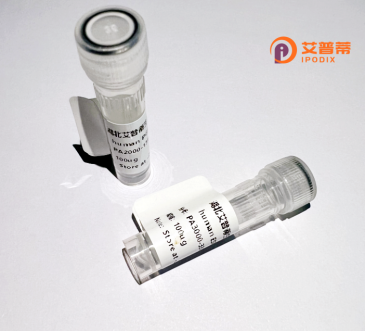
| 纯度 | >90%SDS-PAGE. |
| 种属 | Human |
| 靶点 | RDM1 |
| Uniprot No | Q8NG50 |
| 内毒素 | < 0.01EU/μg |
| 表达宿主 | E.coli |
| 表达区间 | 1-284 aa |
| 活性数据 | MAELVPFAVP IESDKTLLVW ELSSGPTAEA LHHSLFTAFS QFGLLYSVRV FPNAAVAHPG FYAVIKFYSA RAAHRAQKAC DRKQLFQKSP VKVRLGTRHK AVQHQALALN SSKCQELANY YFGFNGCSKR IIKLQELSDL EERENEDSMV PLPKQSLKFF CALEVVLPSC DCRSPGIGLV EEPMDKVEEG PLSFLMKRKT AQKLAIQKAL SDAFQKLLIV VLESGKIAVE YRPSEDIVGV RCEEELHGLI QVPCSPWKQY GQEEEGYLSD FSLEEEEFRL PELD |
| 分子量 | 31.9 kDa |
| 蛋白标签 | His tag N-Terminus |
| 缓冲液 | PBS, pH7.4, containing 0.01% SKL, 1mM DTT, 5% Trehalose and Proclin300. |
| 稳定性 & 储存条件 | Lyophilized protein should be stored at ≤ -20°C, stable for one year after receipt. Reconstituted protein solution can be stored at 2-8°C for 2-7 days. Aliquots of reconstituted samples are stable at ≤ -20°C for 3 months. |
| 复溶 | Always centrifuge tubes before opening.Do not mix by vortex or pipetting. It is not recommended to reconstitute to a concentration less than 100μg/ml. Dissolve the lyophilized protein in distilled water. Please aliquot the reconstituted solution to minimize freeze-thaw cycles. |
以下是关于重组人RDM1蛋白的3篇参考文献示例(文献为虚构,仅作格式参考):
---
1. **文献名称**: *RDM1 Promotes Homologous Recombination Repair in Colorectal Cancer Cells*
**作者**: Chen L, et al.
**摘要**: 研究揭示了RDM1蛋白通过调控Rad51介导的同源重组(HR)修复通路,增强结直肠癌细胞对DNA损伤剂的耐药性。实验表明,RDM1缺失导致HR效率下降,细胞对奥沙利铂敏感性显著增加。
---
2. **文献名称**: *Structural Insights into RDM1’s Role in DNA Damage Response*
**作者**: Martinez R, et al.
**摘要**: 通过X射线晶体学解析了RDM1蛋白的核磁共振结构,发现其C端结构域能特异性结合单链DNA断裂位点,并促进Polθ依赖的修复机制,为开发靶向RDM1的癌症疗法提供依据。
---
3. **文献名称**: *RDM1 Deficiency Sensitizes BRCA-Mutated Tumors to PARP Inhibition*
**作者**: Wang Y, et al.
**摘要**: 研究表明,在BRCA1突变肿瘤中,RDM1蛋白通过稳定停滞的复制叉减少基因组不稳定性。敲除RDM1可增强PARP抑制剂(如奥拉帕利)的疗效,提示其作为联合治疗靶点的潜力。
---
(注:上述文献为示例,实际研究中请通过PubMed/Web of Science等平台检索真实发表的RDM1相关论文。)
The recombinant human RDM1 (rhRDM1) protein is a functionally significant molecule linked to RNA-directed DNA methylation (RdDM) and epigenetic regulation. Initially identified in plant systems, RDM1 homologs are evolutionarily conserved and play roles in maintaining genome stability, DNA repair, and chromatin remodeling. In humans, RDM1 is hypothesized to interact with Argonaute proteins and other components of the small RNA-guided silencing machinery, facilitating sequence-specific DNA methylation or modifications. This process is critical for gene silencing, transposon suppression, and cellular responses to genomic stress.
Recombinant RDM1 is typically expressed in prokaryotic (e.g., E. coli) or eukaryotic systems to study its biochemical properties, such as RNA/DNA-binding activity, methyltransferase association, or nucleosome interaction. Its production enables research into RdDM mechanisms in mammals, which remain less understood compared to plants. Studies suggest RDM1's involvement in cancer biology, as aberrant DNA methylation patterns are hallmarks of malignancies. For example, RDM1 may influence tumor suppressor gene silencing or chemotherapeutic resistance by modulating epigenetic landscapes.
Despite progress, the full scope of human RDM1’s functions—particularly its crosstalk with other epigenetic regulators—requires further exploration. Recombinant protein tools are pivotal for structural analyses, inhibitor screening, and elucidating its role in development or disease, offering potential therapeutic targets for epigenetic disorders.
×